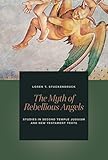The myth of rebellious angels : studies in Second Temple Judaism and New Testament texts / Loren T. Stuckenbruck.
Material type: TextPublication details: Grand Rapids, Michigan : William B. Eerdmans Publishing Company, (c)2017.Description: xx, 427 pages ; 23 cmContent type:
TextPublication details: Grand Rapids, Michigan : William B. Eerdmans Publishing Company, (c)2017.Description: xx, 427 pages ; 23 cmContent type: - text
- unmediated
- volume
- 9780802873156
- Studies in Second Temple Judaism and New Testament texts
- BL480 .M984 2017
- COPYRIGHT NOT covered - Click this link to request copyright permission:
| Item type | Current library | Collection | Call number | Status | Date due | Barcode | |
|---|---|---|---|---|---|---|---|
| Reference (Library Use ONLY) | G. Allen Fleece Library CIRCULATING COLLECTION | Non-fiction | BL480.S932.M984 2017 (Browse shelf(Opens below)) | Available | 31923001904727 |
Originally published: Tubingen : Mohr Siebeck, 2014.
Origins of evil in Jewish apocalyptic tradition: the interpretation of Genesis 6:1-4 in the second and third centuries B.C.E. -- Giant mythology and demonology: from the ancient Near East to the Dead Sea scrolls -- The Lamech narrative in the Genesis apocryphon (1QapGen) and 1 Enoch 106-107: a tradition-historical study of two ancient accounts about Noah's birth -- Demonic beings and the Dead Sea scrolls -- Early Enochic and Daniel traditions in the Dead Sea scrolls -- The book of Tobit and the problem of "magic" -- To what extent did Philo's treatment of Enoch and the giants presuppose knowledge of Enochic and other sources preserved in the Dead Sea scrolls? -- Conflicting stories: the spirit origin of Jesus' birth -- The human being and demonic invastion: therapeutic models in ancient Jewish and Christian texts -- The need for protection from the evil one and John's gospel -- The "cleansing" of the Gentiles: background for the rationale behind the Apostles' decree -- Posturing "apocalyptic" in Pauline theology: how much contrast to Jewish tradition? -- Why should women cover their heads because of the angels? (1 Corinthinas 11:10) -- The Apocalypse of John, 1 Enoch, and the question of influence (with Mark D. Mathews).
The mythical story of fallen angels preserved in 1 Enoch and related literature was profoundly influential during the Second Temple period. In this volume renowned scholar Loren Stuckenbruck explores aspects of that influence and demonstrates how the myth was reused and adapted to address new religious and cultural contexts. Stuckenbruck considers a variety of themes, including demonology, giants, exorcism, petitionary prayer, the birth and activity of Jesus, the Holy Spirit, the conversion of Gentiles, "apocalyptic" and the understanding of time, and more. He also offers a theological framework for the myth of fallen angels through which to reconsider several New Testament texts--the Synoptic Gospels, the Gospel of John, Acts, Paul's letters, and the book of Revelation.-from publisher.
COPYRIGHT NOT covered - Click this link to request copyright permission:
There are no comments on this title.
